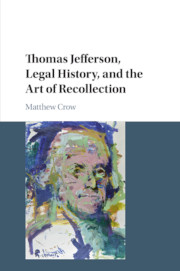'Matthew Crow's book is a dazzling achievement, deepening and expanding our understanding of Jefferson's conception of the meaning of his (and his nation's) past. Not only does it place his struggles with slavery and nationhood in his own time and place, but it provides the present with a cautionary guide to the self-reflection required of all citizens.'
David Konig - Washington University, St Louis
'Matthew Crow’s new book is a beautiful exploration of the shifts in Thomas Jefferson’s thought. Crow gives not only a powerful account of Jefferson’s philosophical understanding of civic membership but also the psychology of his republicanism. This is a remarkable effort of intellectual reconstruction and an essential contribution to scholarship on the early American republic.'
Aziz Rana - Cornell University, New York
'Matthew Crow provides a remarkable and meticulously original account of how Thomas Jefferson wove together intellectual traditions from the Renaissance legal culture, English common law, and Enlightenment philosophy. These were the ingredients of Jefferson’s thought. Crow’s account is a necessary and unique window into the intellectual workings of America’s most brilliant and controversial Founding Father.'
Jacob Soll - University of Southern California
'For Jefferson, usage was the 'arbiter of language.' In this deeply learned and conceptually rich book, Matthew Crow demonstrates how this hermeneutic principle shaped Jefferson’s approach to law, constitutionalism, and history, and makes real sense of Jefferson’s lifelong obsession with salvaging, collecting, recovering texts and making them newly available for use. In the world of Jefferson scholarship, this compelling book truly is something new under the sun.'
Brian Steele - University of Alabama, Birmingham
'Crow’s insights on Jeffersonian thinking make this volume a welcome contribution to the intellectual history of the early Republic. Highly recommended.'
R. F. Lucas, III
Source: Choice



